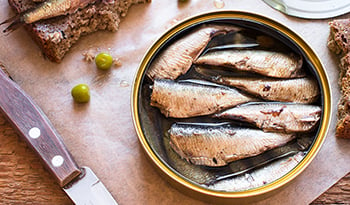What Is a Calorie Deficit? A Dietitian Shares Weight Management Tips
DISCLAIMER:This blog does not intend to provide diagnosis...
- In this article:
- What Is Energy Balance?
- The Three Macronutrients
- Carbohydrates
- Protein
- Fat
- Vitamins and Minerals

Nutritional science is often thought of as the study of food—the nutrients found in foods, how food choices impact health, and how to create a balanced plate. While these are all important aspects of nutritional science, at its core, nutrition involves a lot of numbers. Calories, grams of nutrients, and ratios of these nutrients are a few examples of “nutrition math.”
Let’s dive into these numbers and explore what a calorie actually is, what we mean by energy balance, why you might choose to be at a calorie deficit, and how to do it in a healthy way.
What Is Energy Balance?
The term “calorie” describes the amount of energy a food provides. By definition, a calorie is a unit of energy equivalent to the heat energy needed to raise the temperature of one gram of water by one degree Centigrade.
Knowing the amount of energy a specific portion of food provides allows us to choose quantities of food that meet our individual energy needs. You have energy balance when you consume roughly the same amount of energy that you use in a day. When you achieve energy balance on a regular basis, your weight is likely to stay the same with minimal fluctuations. You may also hear this called “energy-in equaling energy-out.” This approach to nutrition generally leads to weight maintenance.
An energy surplus occurs when you consume more energy, or calories, than you burn in a day. In an energy surplus, you are more likely to gain weight, which could be from fat or muscle, depending on your exercise type, frequency, and intensity.
Conversely, a calorie deficit occurs when you eat fewer calories than you burn in a day. Maintaining a healthy caloric deficit is an approach to losing weight. A calorie deficit encourages your body to use reserved energy, like body fat, to make up the difference between the energy you consume and what you use in a day.
While maintaining a calorie deficit can help you lose weight, consuming high-quality foods that are rich in macronutrients, vitamins, and minerals is especially important. Maintaining a calorie deficit that is too large or for too long can have a negative impact on your body. So, working with a registered dietitian when altering your calorie intake to achieve weight loss is essential.
The Three Macronutrients
The calories in the foods you eat come from the three macronutrients—carbohydrates, protein, and fat. Each type of macronutrient provides your body with a specific amount of energy in calories:
While micronutrients like vitamins and minerals are essential for health, they do not provide any energy.
- Carbohydrates: Every gram of carbohydrates provides your body with four calories.
- Protein: Like carbohydrates, your body gets four calories for every gram of protein you consume.
- Fat: Fat is more energy-dense than the other two macronutrients. For every gram of fat you eat, your body gets 9 calories.
Carbohydrates
Though they have received a bad rap over the years, mostly unearned and inaccurate, carbohydrates are an important source of calories. In fact, carbs are the primary source of energy for your entire nervous system, including your brain. When you are in a calorie deficit, consuming enough carbs is essential for supporting your body’s basic needs. Without enough carbohydrates, your body may break down muscle tissue and proteins to create essential carbohydrates for your nervous system.
Whole grain carbs, like quinoa, brown rice, and oatmeal, are just a few examples of high-quality carbohydrates. Each of these contains essential grams of carb and is also packed with fiber, vitamins, and minerals. They even provide some protein.
The U.S. Department of Agriculture (USDA) recommends at least half of your grains each day should be whole grains. Depending on your age, gender, and energy needs, adults should consume six- to nine-ounce equivalents of total grains per day.1
Brown rice and quinoa make easy side dishes that can be cooked in bulk and added to meals across the week. Oatmeal can be enjoyed hot or cold, added to baked goods, or blended into smoothies. Other examples of convenient whole grains include popcorn, cereal, and pasta.
It is important to remember not all grains are created equally. When choosing products to include in your regular meal and snack rotation, keep these points in mind:
- Emphasize Fiber: Fiber can increase your feeling of fullness, aid in proper digestion, and improve blood cholesterol levels.
- Limit added sugar: Processed whole grain products provide many valuable nutrients but may also contain added sugar. While a small amount of sugar is fine, avoid large amounts of sugar-containing foods. Opt for cereals and flavored oatmeal with lower amounts of added sugar.
Keep these points in mind when shopping for whole grains so you can maintain a calorie deficit while meeting your needs for carbohydrates and the essential nutrients often found in carbohydrate foods.
Protein
Known for its satiating abilities and functions in tissue repair, maintenance, and growth, protein plays an essential role in many areas of the body. Just like with carbs, consuming enough protein is essential when you are in a calorie deficit. Because protein is so important for critical functions like fluid balance, immune system regulation, and maintaining proper pH, your body will break down its protein stores for use in essential functions when dietary intake is too low.
Your body can experience serious consequences when it taps into its own protein stores for prolonged periods. So, eating protein at each meal and at snacks throughout the day is important.
Popular, nutrient-dense protein sources include animal proteins like beef, poultry, pork, eggs, and dairy products. If you are looking for more convenient options that require little to no prep work, try packaged tuna, salmon, or jerky. Tuna and salmon can easily be added to salads and sandwiches, served over crackers, and incorporated into recipes as a convenient protein source. Jerky can pair with fruit or vegetables for a balanced snack that provides essential protein.
For those who follow a plant-based diet or prefer to limit their consumption of animal products, dried edamame, nuts, seeds, and nut butter are sources of protein that can be incorporated throughout the day. While each makes a great snack and can be paired with other nutrient-dense foods, they can also be added to common meals, like salads, sandwiches, or as a side item in a bento box-style meal.
When you are eating to achieve a calorie deficit, it’s important to incorporate protein into every meal for its high satiety value. This means it helps you feel fuller longer compared to equal calories from carbohydrates. You may notice feelings of hunger when in a calorie deficit, so filling foods, like those containing protein and fiber, can help keep you satisfied until your next meal or snack.
Fat
Fat is another nutrient that has unfairly received a bad reputation over the years. Fat comes in heart-healthy forms, like unsaturated fat, and less-beneficial forms, like saturated fat and cholesterol. While you should aim to get most of your fat intake from unsaturated fat, small amounts of other fats can still be part of a healthy diet and contribute to the calories you need to get through each day.
So many foods provide healthy fats, many of which are incredibly versatile and can be added to numerous preparations and recipes. Olive oil, nuts, seeds, nut butter, and even fish, like salmon, contain healthy unsaturated fats.
You can use olive oil to prepare homemade dressing, dip with whole-grain bread, or marinate your proteins. Nuts and seeds can be eaten on their own or incorporated into anything from salads to baked goods. Nut butter can be enjoyed with fruit or more savory options, like crackers, for a snack or meal component.
Fat contains more calories per gram than protein and carbs provide, so it is important to stay mindful of your portions to maintain a calorie deficit. Even though it is a more calorie-dense food, it is an essential part of each meal and can be included in your snacks, too.
Fat also has a high satiety value, which can help you feel full throughout the day. So, in addition to helping your body absorb certain vitamins and producing important hormones, fat also keeps you full between meals—especially when eating at a calorie deficit.
Vitamins and Minerals
Nutritious foods don’t just contain carbs, protein, and fat— they also provide a variety of vitamins and minerals. When eating at a calorie deficit, consuming a wide range of foods is ideal for meeting your micronutrient needs. Additionally, consider supplementing with vitamins and minerals to ensure you consume enough of each nutrient. While a well-rounded diet is ideal for meeting your nutrient needs, supplements can be incredibly helpful for avoiding deficiencies.
References:
- Grains | MyPlate. Accessed March 14, 2023. https://www.myplate.gov/eat-healthy/grains

 By Melissa Rifkin, MS, RDN, CDN
By Melissa Rifkin, MS, RDN, CDN


